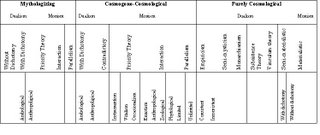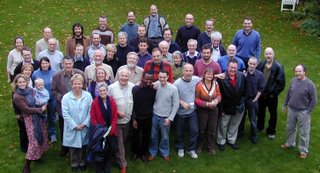
A while back I posted some quotes on philsophy and universality. These had been promted by reading James Smith's book on Derrida. Here are some belated thoughts on Derrida and universality.
Derrida’s early critiques of Husserl and logocentrism focuses on the way that philosophy has historically excluded materiality in favour of the spiritual/rational. In particular when dealing with language philosophy has conceived it in terms of writing (as material) in opposition to speech which is thought of as more spiritual. Derrida challenges this by showing how what is excluded or denigrated in philosophical discourse - materiality in the form here of language and history - is actually a necessary condition for what philosophy elevated, purity given here as geometrical thought. So in his introduction to Husserl’s Origin of Geometry Derrida writes:
“Whether geometry can be spoken about is not, the extrinsic and accidental possibility of a fall into the body of speech or of a slip into a historical movement … The paradox is that, without the apparent fall back into language and thereby into history, a fall which would alienate the ideal purity of sense, sense would remain an empirical formation imprisoned as fact in a psychological subjectivity – in the inventors head. Historical incarnation sets free the transcendental, instead of binding it (IHOG, 77)” (quoted in Smith p.24)
In other words pure universality (absolute ideal objectivity) is deconstructed on the basis of a materiality which reasserts itself within a philosophical system that seeks to exclude it, and does so “as the very condition of possibility of what philosophy want” viz. pure objectivity (Smith p.25).
Later Smith discusses Derrida’s turn to issues of ethics, justice, hospitality and religion. Here Derrida turns deconstruction in the opposite direction criticising current particular configurations (i.e. “the fall back … into history”) of justice, hospitality, and so on, in the name of a pure, unconditional, undeconstructible justice, hospitality etc. This gives Derrida’s ethics a Kantian feel to it in its formalism. So Derrida talks of ‘the formality of a structural messianism’ that is without messianism, “an idea of justice – which we distinguish from law or right or even human rights – and an idea of democracy – which we distinguish from its current concept and from its determined predicates today” (Spectres of Marx 59 quoted in Smith p.86). “This critique” that Derrida’s project of deconstruction is now engaged in “belongs to the movement of an experience open to the absolute future of what is coming, that is to say, a necessarily indeterminate, abstract, desert-like experience that is confided, exposed, given up to its waiting for the other and for the event” (SM, 90 quoted pp.87-88).
This suggests an important shift, paradoxical perhaps. Where at first Derrida seems to target ideas of purity, of absolutes beyond any materiality, because their condition of possibility involves determinate materiality, later it is this determinate materiality that becomes the focus of deconstruction because there is always the future to come. If it could be said that early Derrida held that “purity is always deconstructible,” Derrida’s later claim is that “content … is always deconstructible” (SM, 90 quoted p.87)


 'Danielson: a Family Movie'
'Danielson: a Family Movie' 




